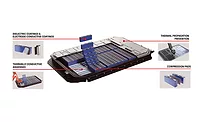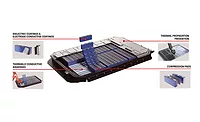Arkema Is Showcasing Innovations at Battery Show Europe 2023

At The Battery Show Europe 2023, held May 23-25 in Stuttgart, Germany, Arkema is showcasing innovations for a more sustainable performance inside the cell, innovations outside the cell, and an innovation for more circular “end of life.”
“Arkema has a long history of innovation in the battery industry through its KYNAR® PVDF electrode binders and separator coatings. We are leveraging that knowledge, the Group’s extensive network of partner customers globally and unique synergies across its high-performance polymers, adhesive and coating solutions segments to invest heavily in the future of that market,” said Anthony Bonnet, scientific director, Global Energy.
The following are a few of the innovations Arkema is showcasing this year:
More Sustainable Performance Inside the Cell
- Arkema's flagship Kynar® PVDF is showcased as a high-performance material with a legacy for battery cell manufacturing. Kynar PVDF is an efficient solution as an electrode binder and edge coating allowing outstanding performance throughout the cells' service life. PVDF is a material of choice as a binder and adhesive layer for battery cell separator coatings.
- Arkema will present its Foranext® LiFSI lithium salt, well-known for its conductivity. The ultra-high purity and stability of Foranext LiFSI helps with the capacity retention of the battery cell. Foranext LiFSI stability in water is compatible with hydrometallurgy recycling processes. LiFSI is stable in water, enhancing safety (no additional HF generation) but also gives LiFSI great recovery potential.
- Arkema recently introduced new acrylic-based solutions targeting higher cell performance with faster charging, longer life-cycle durability, and increased energy density while ensuring world-class safety and environmental compliance. The Incellion™ waterborne acrylic solutions are suitable for high-capacity anodes, cathode primers, and ceramic-coated separators.
Innovation Outside the Cell
- To provide a solution for thermal management, Bostik introduced thermal conductive adhesives (TCA) for bonding battery cells and managing heat in cell-to-pack designs. The XPU TCA 202 is a two-component, polyurethane-based adhesive specifically designed for heat dissipation in battery pack assemblies. It balances thermal conductivity with high mechanical strength while maintaining good levels of flexibility due to high elongation. Its low-monomer content allows it to meet the most stringent regulations and enables easy product handling without specific training. At a practical level it is also fast and easy to process through automatic mixing, dosing, and dispensing equipment. It adheres well to most substrates without using a primer, and cures at room temperature.
- Another product offering solutions for thermal management, 100% bio-based Oleris® material for direct fluid immersion cooling systems is derived from renewable castor oil and enhances dielectric fluids in battery direct liquid immersion cooling systems. The 100% bio-based n-heptanoic acid and carbon-neutral C7 fatty acid enables the synthesis of high-performance polyol esters, resulting in dielectric fluids with low viscosity, lower pour point, oxidation stability, and biodegradability. This technology reportedly marks a major step forward in the development of more sustainable solutions for battery thermal management.
- With the emergence of electric mobility, new solutions that allow decarbonization are emerging, including those that offer lower-energy-intensive dielectric insulation. New solvent-free UV technology enables low energy consumption, instant drying, and ease of application; all key factors for efficiency and mass production of dielectric coatings for battery cells. The high-performance Sartomer® UV curable specialties are enabling this transition, providing excellent dielectric properties, adhesion, and flexibility.
- Offering a solution to lower the carbon footprint of EV busbars, 100% bio-based Rilsan® Polyamide 11, derived from renewable castor plants, offers superior abrasion, thermal, and chemical resistance. Demonstrating its commitment to sustainability, Arkema has partnered with ENGIE to supply 300 GWh/year of renewable bio-methane, further reducing the carbon footprint of Rilsan Polyamide 11.
Innovation for More Circular “End of Life”
- Arkema is collaborating with the Rhinoceros Project, a consortium dedicated to advancing sustainable reuse and recycling of lithium-ion batteries across the European Union. Hosting a recent meeting, the members focused on cost-effective and sustainable technologies for recovering and recycling KYNAR PVDF, widely used as a battery cell electrode binder. Learn more about the project here.
To learn more about battery solutions from Arkema, click here or visit booth # Booth J35 - Hall 10 at The Battery Show in Stuttgart, Germany.
Looking for a reprint of this article?
From high-res PDFs to custom plaques, order your copy today!






